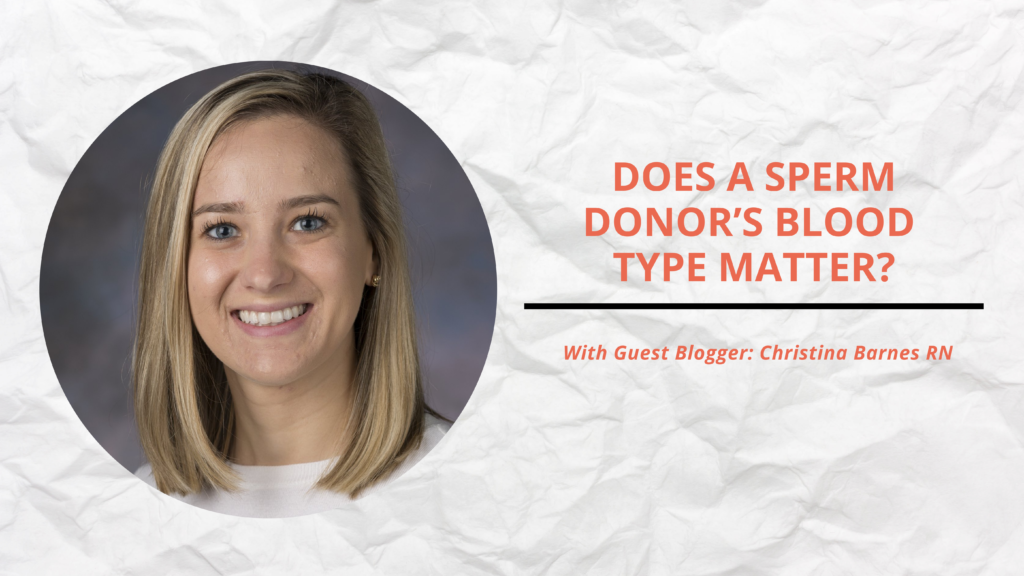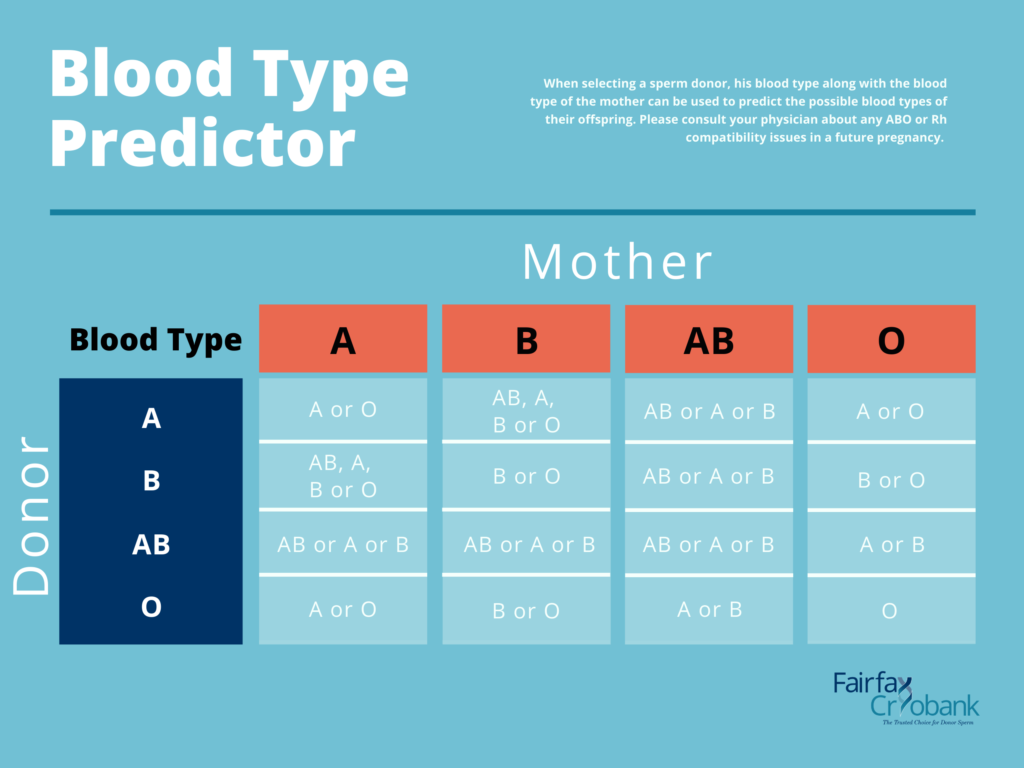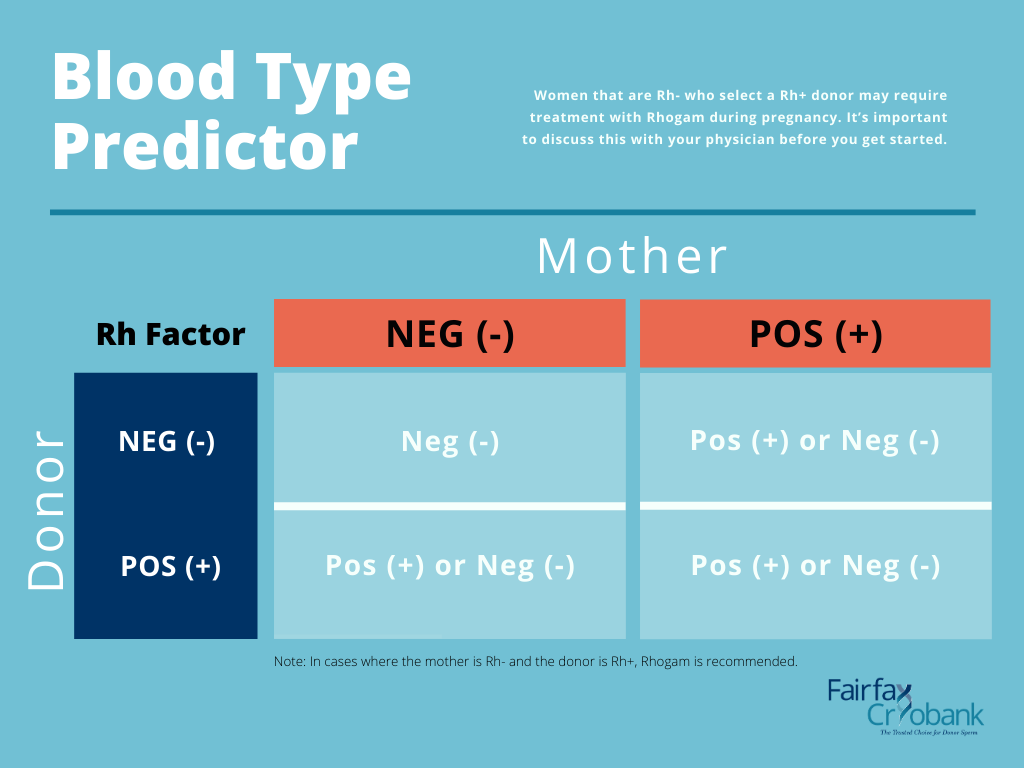Does a Sperm Donor’s Blood Type Matter?
Guest blogger, Christina Barnes RN, dives into the importance behind sperm donor blood type and if it matters when choosing your sperm donor

After hours of research thought, and reflection, you’ve settled on what will be the most important traits in your sperm donor. You’ve finally narrowed your list of potential donors down to a few top candidates. You’ve considered hair color, height, education level, and perhaps the carrier status of a rare genetic disease. You’ve considered whether you want your donor to be an elite athlete or an accomplished intellectual. Maybe you’ve worked with your sperm bank to try to find someone who resembles your partner as closely as possible. You’ve found the donors who meet your criteria and you’re excited to finally pick “the one.” In all of your research for that best fit, one thing you may not have considered is sperm donor’s blood type.
Does the sperm donor’s blood type matter? In many cases, it doesn’t matter, but in some cases, it might. Before we go any further, though, I want to point out that while the information in this article is meant to be helpful, it is not meant to replace the advice of your medical professionals. Any questions that you have about your specific blood type, your donor’s blood type, and which donors you can use should be discussed with your doctors.
There are two components to a person’s blood that will affect an offspring’s blood type: the blood type itself (type A, type AB, etc.) and Rh Factor. We’ll discuss both of these, starting with the most straightforward: blood type.
Blood Type
What is a blood type? There are four blood types: A, B, AB, and O. If you have type A blood, for example, your blood has the type A antigen. You are born with these antigens and this blood type, and you cannot change them.
What are antigens? Antigens are proteins or sugars that are attached to the red blood cells, letting your immune system know that these blood cells are part of the body and should not be attacked. If you have type A blood and receive a blood transfusion of type B blood, your body will not recognize the type B antigens and will attack those type B blood cells. Your immune system sees these foreign antigens and thinks they could belong to a virus or a bacteria, and thus treats them like a potentially harmful invader. This is why people with certain blood types cannot receive blood transfusions from people with different blood types.
So people cannot freely mix blood types during a transfusion; does this mean that you cannot have a baby with someone of a different blood type? Not at all. Your blood type and the blood type of your partner or donor will affect the blood type of your offspring, but differences in blood type will not cause harm to the woman or the fetus. A woman with type A blood and a man with type B blood can safely procreate. Using the chart below, you can see the possible blood types of their offspring: A, B, AB, or O. I know myself to be type A blood, but nobody even checked my husband’s blood before we conceived or while I was pregnant. This is not something that healthcare providers even really need to know in order to care for the mother or baby.

Rh Factor
Rh factor, though, is a different story. If a woman is Rh-negative (-) and becomes pregnant with the sperm from a man who is Rh positive (+), she may be at risk for complications in future pregnancies.
What is Rh factor? Rh factor, short for Rhesus factor, is an antigen found on blood cells, If a person has the Rh factor antigen on their blood cells, they are Rh-positive. If they do not have the Rh factor antigen, they are Rh-negative.
Why does this matter in pregnancy? If a woman who is Rh-negative becomes pregnant with sperm from an Rh-positive man, there is a chance that her fetus will have Rh-positive blood. If the Rh-positive blood from the fetus enters the bloodstream of the Rh-negative mother during pregnancy, the mother’s body will recognize the fetus’ blood as a foreign substance. The mother’s body will create anti-Rh antibodies, which can cross the placenta and attack the fetus’ blood cells. This may or may not affect the mother’s first pregnancy with an Rh-positive fetus, but all future Rh-positive babies will be at risk.
What is the treatment for an Rh-negative mother who may be pregnant with an Rh-positive fetus? Rhogam is an injection (shot) given to an Rh-negative mother to prevent her body from creating anti-Rh antibodies that could harm the fetus. This is given when the sperm donor or fetus may be Rh-positive. The decision on whether or not to give this shot will be made by the woman and her physician.
I am Rh-negative. What does this mean for choosing a sperm donor? If you are an Rh-negative female looking to conceive with donor sperm, it is recommended that you choose a donor who is also Rh-negative. If you select an Rh-positive donor, you may require treatment with Rhogam during pregnancy. If you have any questions about selecting a donor based on Rh factor type, you should discuss this with your physician.

Rh factor in pregnancy can be difficult to fully understand, so if you want to read more about it check out these resources for patients:
American College of Obstetricians and Gynecologists (ACOG):
https://www.acog.org/womens-health/faqs/the-rh-factor-how-it-can-affect-your-pregnancy
Rhogam Patient Information: How Rhogam Works:
https://www.rhogam.com/patients/how-rhogam-works/
Next Steps
If you are a woman who is Rh-negative looking for a donor, feel free to reach out to your sperm bank to let them know that you are Rh-negative. Fairfax Cryobank will work with you to help you find a donor that fits your personal and medical requirements, following the recommendations of your physician. If you know you will need to use a sperm donor but don’t know your blood type, it might be a good idea to have your blood type tested before you start looking for donors. That way, if you’re Rh-negative, you can spend your time and energy focusing on other Rh-negative donors who may be the best fit. As always, if you have any questions about your blood type and pregnancy, follow up with your physician. Learn more by visiting Fairfax Cryobank’s Blood Type Predictor page.







